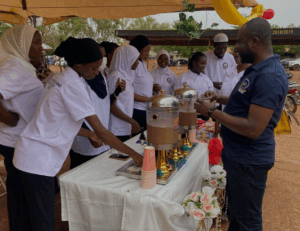By Samuel SAM
The Department of Food Science and Technology (DFST) at Tamale Technical University (TaTU) has held a food bazaar exhibition as part of an Entrepreneurship Fair aimed at showcasing students’ practical skills and promoting entrepreneurship.
The event, supervised by Madam Barbara Konadu, formed part of the department’s practical training under the Bakery Technology course. Students prepared and sold a variety of Ghanaian dishes, beverages and baked goods to demonstrate their culinary and entrepreneurial abilities.

Speaking to the media, Head of Department Dr. Fatawu Alhassan explained that the exhibition was a direct outcome of the students’ hands-on learning and an opportunity to apply classroom theory in a real-world setting. He emphasised the importance of practical training in helping students acquire marketing and product development skills.
Dr. Alhassan added that the entrepreneurship programme is designed to equip students with the confidence and capability to start their own businesses after graduation, rather than rely solely on government employment. “They have the theoretical knowledge but without the practical side, it’s difficult to become self-reliant. This event helps bridge that gap,” he said.
He highlighted the initiative as a potential solution to youth unemployment, urging vocational and technical institutions to adopt more practical approaches to teaching.

Dr. Alhassan commended the students for their enthusiasm and the lecturers for their support in guiding the practical work. He noted that continued use of such platforms will boost students’ confidence and encourage more young people to pursue entrepreneurship.
Madam Barbara Konadu described the exhibition as an important part of student development, saying it helps prepare them for real-world challenges beyond the classroom.
A participating student, Fawzia Awal, expressed gratitude to the university’s management and lecturers. “The practical work has helped us understand what goes into food production before approval by regulators,” she said.










